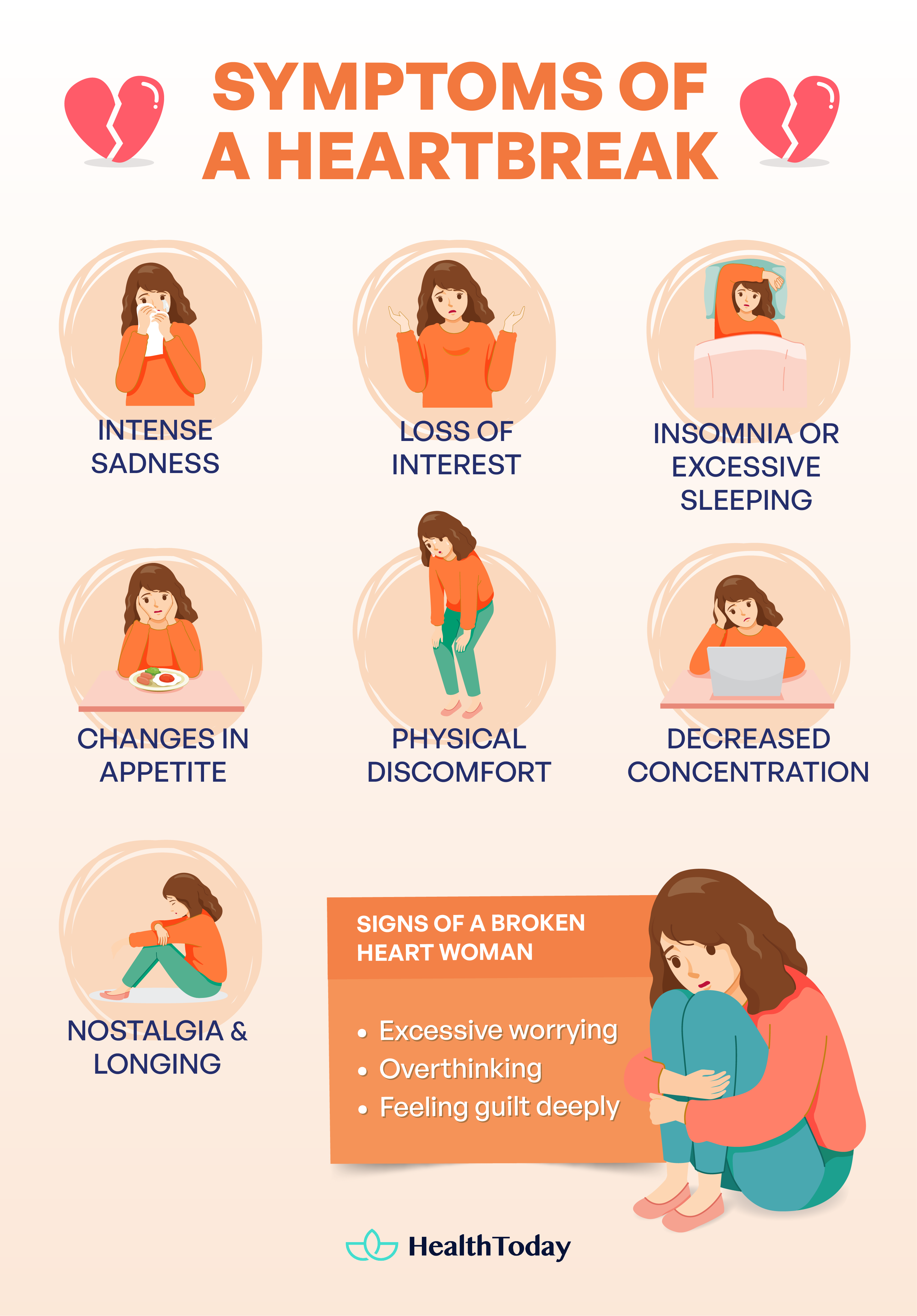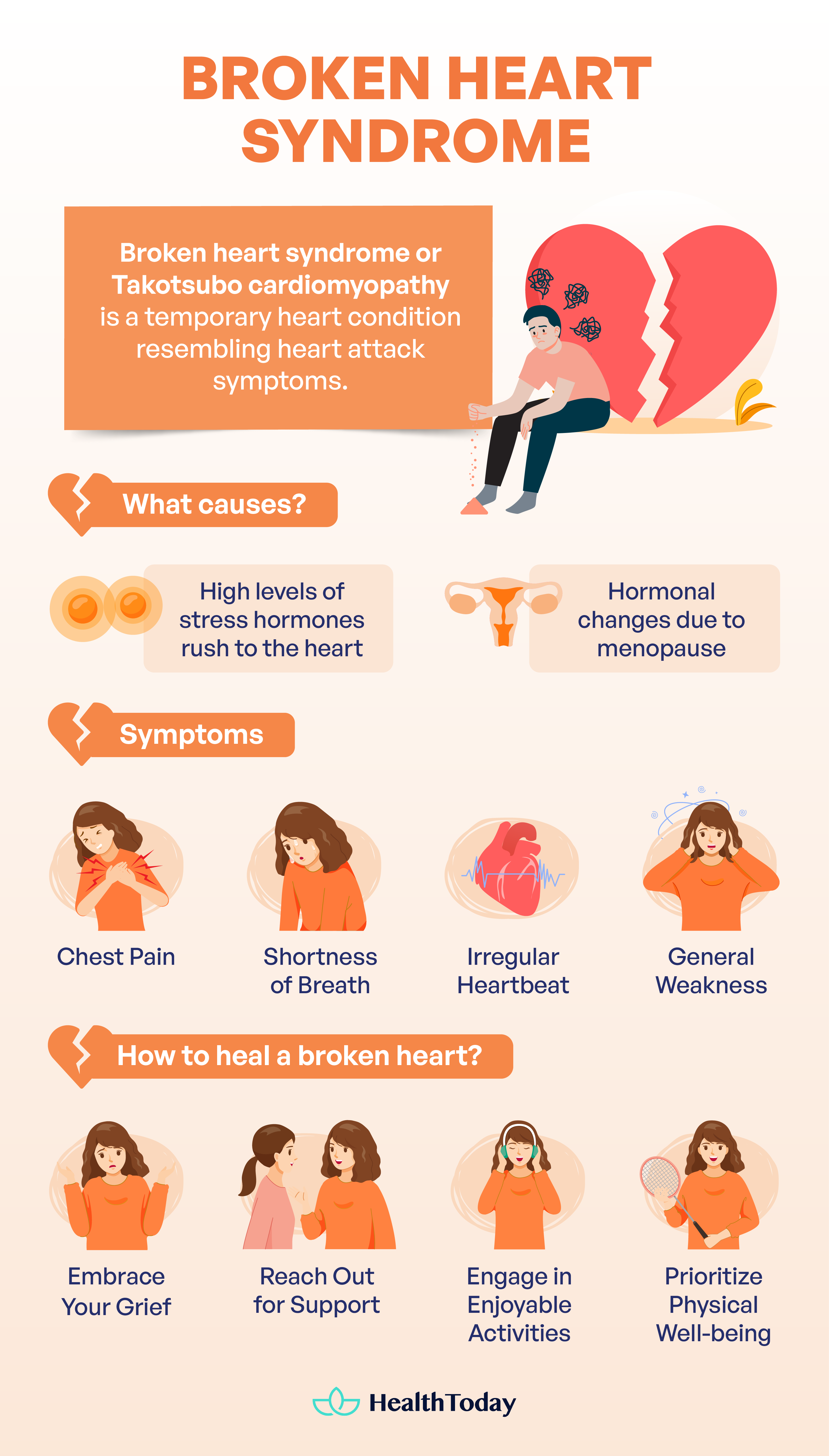Table of Contents
Experiencing a heartbreak and aren’t quite sure how to navigate it? Recognizing the signs you have a broken heart is the first step towards healing, acting as a guiding light amidst all the chaotic feelings.
This article explores the symptoms of heartbreak, helps you understand the broken heart syndrome, and offers practical ways to heal and regain your emotional peace. Together, we can navigate the ebbs and flows of heartbreak and find a way back to a happier, healthier, and healed you.
What does heartbreak feel like?
Experiencing a heartbreak is a personal journey, with each person experiencing it differently. One can be engulfed in overwhelming sadness, while others grapple with anger, confusion, and despair.
Naturally, none of us want an eternity spent in this sad void, but to escape it, we first need to understand the true nature of heartbreak.
Unknown feelings can be scary and difficult, but knowing the symptoms of heartbreaks can serve as a beacon, guiding us toward emotional peace.
How to know if your heart is broken emotionally – Symptoms of a heartbreak

To understand if you’re emotionally heartbroken, it helps to know what to look for:
- Intense sadness: This is often the most immediate symptom and can feel like it consumes all aspects of life.
- Loss of interest: Activities or hobbies you previously enjoyed may no longer appeal to you. You may also lose interest in socializing.
- Insomnia or excessive sleeping: Heartbreaks may disrupt your sleep pattern, causing insomnia or sleeping more than usual.
- Changes in appetite: A significant increase or decrease in appetite may lead to weight gain or loss.
- Physical discomfort: Stomachaches, headaches, or a general feeling of being unwell may appear.
- Decreased concentration: You may struggle to focus on tasks or make decisions.
- Nostalgia and longing: You may continually revisit memories of the lost relationship or loved one, wishing things could go back to the way they were.
Signs of a broken heart in women
Although heartbreak is not confined to any gender and affects everyone, societal and cultural norms can influence how women experience and express their heartbreak.
Excessive worrying may be a common sign of a broken heart in women. You might replay scenarios repeatedly in your mind, wondering if there were things you could have done differently. This kind of rumination can lead to sleepless nights and constant distress, compromising the body and mind (1).
Overthinking is another hallmark symptom. You may scrutinize every detail of the relationship, analyzing past conversations, actions, and reactions. This might spiral into a sense of guilt and self-blame, worsening the pain of heartbreak.
Feeling guilt deeply may also be common. Women tend to take on emotional responsibility, often blaming themselves for the end of the relationship. This intense guilt can keep you stuck in a cycle of self-recrimination and despair, which slows down the healing process.
However, societal expectations shouldn’t dictate how one should cope with heartbreak. Everyone’s heartbreak journey is unique, and there’s no one-size-fits-all approach to healing. What’s important is to go at your own pace and allow yourself to feel your emotions.
Broken heart syndrome— is it real? Takotsubo symptoms
Having chest pain after a breakup? While emotional heartbreak is undoubtedly painful, it’s important to know that heartbreak can also have physical manifestations.
Takotsubo cardiomyopathy, commonly called broken heart syndrome, is a temporary heart condition resembling heart attack symptoms (2).

What causes Takotsubo cardiomyopathy
Although the exact cause of Takotsubo cardiomyopathy is unclear, there are multiple theories of the occurrence of the syndrome.
The most popular belief is the stress hormone theory. When high levels of stress hormones such as cortisol rush to the heart, it can increase blood pressure and heart rate (3, 4).
In some people, this surge can cause the left ventricle of the heart (the main pumping chamber) to change shape, compromising its ability to pump blood. This impaired function might cause chest pain, shortness of breath, and even heart failure.
However, unlike a heart attack caused by a blockage, the heart muscle in Takotsubo cardiomyopathy is not permanently damaged. Once the stressful event is over and stress hormone levels return to normal, the heart usually returns to its normal shape and functions properly.
Another possible cause is because of hormonal changes due to menopause.
Post-menopausal women may be more dangerous to Takotsubo cardiomyopathy due to lower estrogen levels, a protective hormone for the heart (2). This might be one of the reasons why women are socially viewed as emotionally burdened during sad times.
Heartbroken symptoms of broken heart syndrome
Common symptoms of the broken heart syndrome include:
- Chest Pain: This most common discomfort can feel like a sharp, stabbing pain or heavy pressure in the chest area.
- Shortness of Breath: You might experience difficulty breathing. This shortness of breath can occur both at rest and during physical activities.
- Irregular Heartbeat: This could manifest as a racing, slow, or fluttering heartbeat.
- General Weakness: A general feeling of dizziness or overwhelming fatigue is also common.
Currently, there are no set guidelines for treating Takotsubo cardiomyopathy as we need more data from randomized trials, so treatment is based on doctors’ clinical experience and expert opinions.
Although most patients with Takotsubo cardiomyopathy recover, prolonged heart pain can also be associated with several other heart conditions, making it crucial to seek immediate medical attention. Proper diagnosis often requires an electrocardiogram, cardiac MRI, or a chest x-ray.
Broken heart syndrome, or Takotsubo cardiomyopathy, is a temporary heart condition caused by severe stress, often mimicking a heart attack. High levels of stress hormones may trigger changes in the heart’s main pumping chamber, leading to symptoms like chest pain and shortness of breath. Usually, it doesn’t cause lasting harm and your heart returns to normal once the stress is over. While there’s no standard treatment, it’s important to seek medical care if you have chest pain for a long time, just to make sure it’s not a serious heart condition.
How to heal a broken heart?
Experiencing a broken heart can feel like being lost in a maze with no evident way out. The journey to healing might appear overwhelming or even impossible.
But rest assured, with time, patience, and an intentional focus on self-care, it is possible to mend a broken heart. These are some methods that can help you regain your emotional tranquility:
Embrace your grief
The first and perhaps most essential step to healing is to let yourself grieve. Do your best to accept the process and the feelings that come and go.
It’s normal, even healthy, to experience different emotions after a heartbreak. Instead of suppressing these emotions, allow yourself to feel them fully.
You can embrace and express your grief by writing it down or sharing it with someone you trust. This validation provides a safe space for your emotions, which can lead to a more effective healing process. This also has a soothing effect on the amygdala, the part of the brain associated with fear and emotions.
Reach out for support
In times of heartbreak, you might feel the urge to isolate yourself or believe that no one can understand your pain. However, humans are social creatures, and we thrive on connection, especially in emotional distress.
As you navigate the course of heartbreak, remember that you don’t have to do it alone. Reach out to trusted friends or family members. Share your feelings with them, and let their support and understanding soothe your wounded heart.
If your feelings seem overwhelming or persistent, consider seeking professional help. Finding professional help is not shameful; therapists and counselors can provide valuable tools and techniques to help you navigate your feelings.
Engage in enjoyable activities
Engaging in activities you enjoy can provide a welcome distraction from your pain and can help uplift your mood. You could revisit a hobby you’ve always loved or explore new interests.
Remember, some may resort to unhealthy habits like overeating or drinking excessively after a heartbreak, but we recommend engaging in constructive activities instead. Rather than escaping from your pain, these activities offer a break and serve as a reminder that joy exists beyond your current sorrow, motivating you to move on.
This could be as simple as reading a book, painting, gardening, cooking your favorite meal, or even a regular walk in the park.
Prioritize physical well-being
The philosopher Friedrich Nietzsche believed that happiness lies in the body, not in the mind. This is true: our physical health significantly impacts our emotional well-being.
Regular exercise not only keeps you physically healthy but also releases endorphins – the body’s natural mood boosters. Maintaining a nutrient-dense, balanced diet ensures that your body and brain get the necessary nutrients to function optimally. Adequate sleep is also crucial, as it can affect your mood and energy levels. Sleep helps to detoxify, restore, and renew the body and mind.
During this challenging time, prioritizing your physical well-being can significantly influence your emotional healing process.
Yoga and meditation may be particularly helpful practices to adapt during this time. Research suggests that we often store emotions in the body; therefore, yoga may be helpful in releasing some of those emotions. Meditation has been well evidenced to support brain health, especially neuroplasticity— helping the brain to form new connections and memories.
Going through a heartbreak can be tough, but it can get better with time and self-care. It’s important to allow yourself to grieve and fully feel the emotions that arise, offering yourself a safe space to process them. Talking to friends, family, or a therapist can help a lot. Engaging in activities you enjoy can be a positive distraction and remind you that there’s happiness beyond this tough time. Also, staying healthy by exercising, eating well, and getting enough sleep can help you feel better emotionally.
How to help someone with a broken heart?
Empathy and patience are key when helping someone with a broken heart. Let them express their feelings without judgment. Don’t rush to fix things or offer solutions, be there for them. Then you can further encourage self-care routines like eating well, getting enough sleep, and regular physical activity.
Can a breakup make you sick?
Yes, the intense stress and emotional disruption from a breakup can lead to physical symptoms, including headaches, stomach issues, disrupted sleep, and reduced immune function. This highlights the multitude of body-mind connections and is backed by science. Psychoneuroimmunology or PNI, is the study of how emotional stress influences immunity and hormonal and neural health (5). Maintaining a healthy lifestyle, trying stress-management techniques, and seeking emotional support can help reduce these physical symptoms.
Why does my heart hurt after a breakup?
When you experience a breakup, your body can produce stress hormones that stimulate the fight-or-flight response, which can cause sensations like a tightening or aching in your chest. Usually, deep breathing exercises and mindful practices can alleviate these pains.
How does a broken heart start?
A broken heart often starts with an emotional trauma and typically occurs from the end of a relationship, but the loss of a loved one or a deep disappointment can also cause a broken heart. This emotional trauma can trigger intense sadness, rejection, and despair.
How long does heartbreak last?
The duration of heartbreak varies significantly from person to person. Some studies suggest that most people start to feel better after about three months, but it’s common that the healing process can take six months or even a year. Again, what’s important is to go at your own pace, tuning into what your body, mind and heart need.
What is the 3-month rule after a breakup?
The 3-month rule suggests waiting at least three months after a breakup before entering a new relationship. This period allows for self-reflection, healing, and rediscovery. It’s also a respectful period if the previous relationship was significant. However, it’s not a one-size-fits-all rule; everyone should move forward at their own pace.
What are the signs of heartbreak in a man?
Common signs in men include increased anger or irritability, engaging in risky behaviors, withdrawal from social activities, or an excessive focus on work or hobbies. It’s important to encourage open communication about emotions and provide support during this time. This is especially important for men, as they are often socialized to suppress or minimize vulnerability and emotions. Encouraging a safe space and acceptance is therefore significant.
Summary
Heartbreak is a deeply personal and often painful experience, with signs of a broken heart ranging from intense sadness and loss of interest to physical discomfort and changes in sleep or appetite.
A broken heart can also present as “broken heart syndrome” or Takotsubo cardiomyopathy, a temporary heart condition triggered by severe stress that mimics a heart attack.
Despite the pain, there are many ways to heal from heartbreak. It’s essential to embrace your grief and allow yourself to fully feel the emotions, reaching out for support when needed. Engaging in enjoyable activities and prioritizing physical well-being through exercise, a balanced diet, and adequate sleep can significantly aid your healing.
The journey through heartbreak might be hard, but with time, patience, and self-care, recovery is entirely possible.

















Comments
0